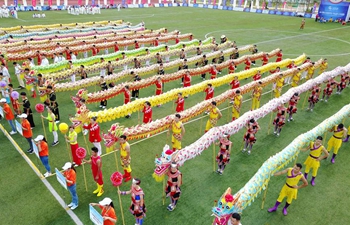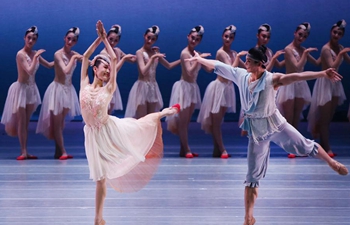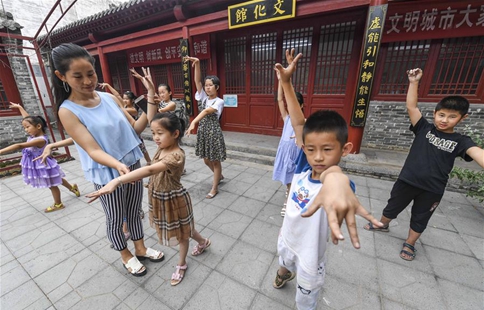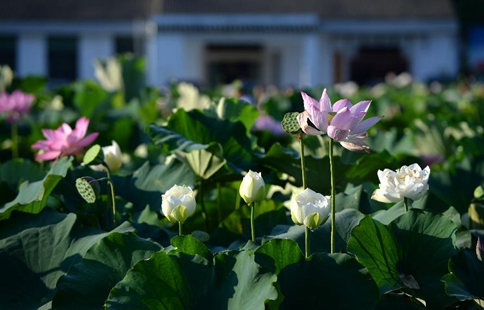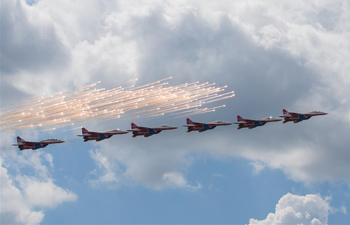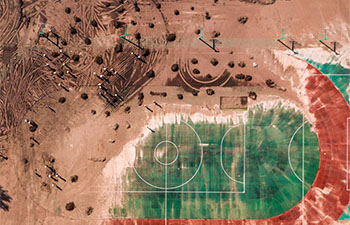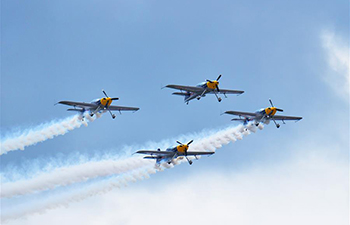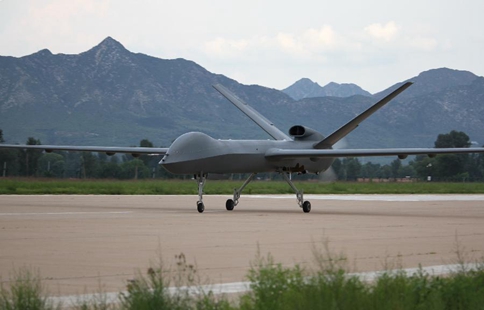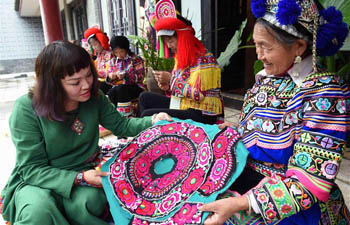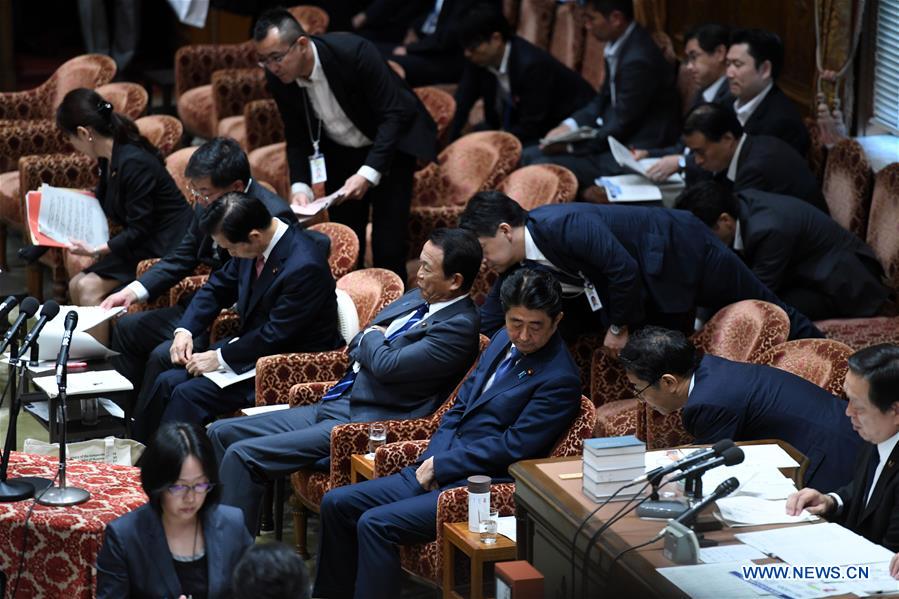
Japanese Prime Minister Shinzo Abe (3rd R) prepares to speak in a special session of the House of Representatives Budget Committee in Tokyo, Japan, July 24, 2017. Shinzo Abe was accused to have used his influence to manipulate a government decision to benefit a close friend's opening of a veterinary school in a special deregulated zone. Speaking in a special session of the House of Representatives Budget Committee on Monday, Abe maintained that he had not given any instructions personally on matters related to the veterinary department's opening.(Xinhua/Ma Ping)
TOKYO, July 24 (Xinhua) -- Japanese Prime Minister Shinzo Abe on Monday was given the third degree from opposition party lawmakers on his alleged involvement in an influence-peddling scandal.
He was accused to have used his influence to manipulate a government decision to benefit a close friend's opening of a veterinary school in a special deregulated zone.
The prime minister, amid tumbling public support, was also grilled over his responsibility for selecting Tomomi Inada as defense minister, as she is currently embroiled in a scandal involving the alleged cover-up of logs containing the activities of Japanese troops in what potentially became a controversial UN peacekeeping mission in South Sudan.
Speaking in a special session of the House of Representatives Budget Committee, Abe maintained that there was no favoritism shown to his friend Kotaro Kake who runs Kake Educational Institution, which is set to open a new veterinary department at a private university in Ehime Prefecture, in Japan's northwestern Shikoku region.
In a bid to claw back some public support, Abe reversed an earlier party decision for him to not appear in parliament to be grilled by the opposition, as media polls have shown that the public's mistrust in Abe has risen exponentially recently as he has yet to properly account to himself over the favoritism scandal.
The prime minister, who will reshuffle his cabinet early next month in a further bid to restore public support, conceded that he had been friends with Kake since they were students and sometimes dined together and treated each other to nights out.
Abe maintained however that Kake had never asked for any favors based on Abe's position in politics and that he had not given any instructions personally on matters related to the veterinary department's opening.
Following an opposition lawmaker holding up an enlarged print of a photograph in parliament showing Abe and Kake holding up wine glasses while facing the camera, Abe said, "There is a saying that one should never allow room for doubts. Since this is a matter involving a friend of mine, it is understandable that the people would look at it with suspicion."
Abe, whose ruling party has suffered crushing defeats in recent elections, including in the Tokyo Metropolitan Assembly Election and, more recently, in Sunday's defeat to an opposition-backed former lawmaker who won the Sendai mayoral election, added later that his priority remained with the economy.
"The economy has been the administration's top priority and it's our job to create employment and raise wages," he said.
Abe's support rate has plunged following a series of scandals related to himself, his senior Liberal Democratic Party (LDP) member lawmakers and cabinet ministers, with weekend polls showing his support rate well below 30 percent.
He has long been facing accusations of cronyism from the opposition camp since whistle-blower Kihei Maekawa, former vice education minister, claimed that official ministry documents indicated that Abe's influence was used in favor of Kake being selected.
The documents reportedly suggest that the education ministry was told by the Cabinet Office that the choice for the new department "was heard to have been the prime minister's wish."
The Democratic Party also maintains that documents exist which show that negotiations had taken place between the ministry and the Cabinet Office regarding the set time-frame for opening the new department at the university.
As for the timing of the opening of the new veterinary department at the Okayama University of Science, which was slated for April 2018, one document reportedly states, "This is what the highest level of the prime minister's office has said."
Okayama University of Science was specifically chosen by the government to open a new veterinary medicine school, in Ehime Prefecture.
The prefecture is one of Japan's national strategic special economic zones, which has far more relaxed regulations to boost growth in the area, as part of Abe's overall growth strategy.
However, amid an overabundance of veterinary professionals in Japan, the opening of the school would mark the first of its kind in 50 years.
The Japan Veterinary Medical Association has long been opposed to the opening of a new veterinary school, due to the surplus of vets already working in Japan, it has said.
However, Japan's regional revitalization minister Kozo Yamamoto, who is in charge of the Cabinet Office, which oversees specially deregulated zones, has recently been accused of lobbying the association, telling senior association officials that the new department would be constructed in the western Japan island of Shikoku and that the government intended to approve a plan by Kake to open a new veterinary school.
Kake Educational Institution has applied for permission to open a new veterinary department in the specially deregulated zone 15 times since 2007. All of the previous applications were rejected.
Maekawa has also said that aides close to Abe had exerted pressure from the prime minister's office for the school to be selected and its construction expedited, according to explanations on the matter he gave during a special parliamentary hearing on the matter.
Maekawa said that Isao Kiso, an advisor to the Cabinet at the time, visited his office and requested that he accelerate procedures for the opening of a new veterinary school.
The local city assembly provided the land to the institution to build the new department for free, records show, and, in addition, they provided a hefty 9.6 billion yen (86.52 million U.S. dollars) as a subsidy for the school's construction costs.
Maekawa stated that Kiso asked him to speed up the procedures for opening the veterinary school and that it was his understanding that Kiso was specifically referring to the government's plan involving Kake Educational Institution, because he was a senior official of the institution at that time.
Maekawa also stated that Kiso told him that his ministry need do nothing except follow the decision made by the Council on National Strategic Special Zones, which is chaired by Abe.
He also said he met Hiroto Izumi, an assistant to Abe, at the prime minister's office, when the selection of the strategic zone was underway and was also pressurized to speed up procedures for the new school at that time.
Abe on Monday was also grilled by the opposition camp over an alleged cover-up scandal involving Defense Minister Tomomi Inada and the Ground Self-Defense Force's daily activities in South Sudan during its UN peacekeeping mission there.
The prime minister maintained his protective position of Inada, a close ally of Abe's, which was heavily criticized by opposition party lawmakers on Monday.
In response to Hiroshi Ogushi, policy chief of the main opposition Democratic Party, calling for Inada's resignation, Abe said she would retain her portfolio as she has agreed to carry out a thorough probe on the matter and has allowed herself to be investigated by the Inspector General's Office of Legal Compliance, under the auspices of the defense ministry, to investigate the potential cover-up.
Inada and the Defense Ministry have been accused of trying to intentionally conceal the potentially damaging records of the GSDF's activities during a time when 270 people died in fighting between government forces and rebels in Juba, South Sudan, between July 7 and 12, 2016.
In the recovered logs, the troops said they must be "careful about getting drawn into sudden fighting in the city." The record also refers to the possible "suspension of UN activities amid intensifying clashes in Juba."
Inada, a lawyer-turned-politician, according to claims by opposition party members, was seeking to conceal the logs so as the GSDF troops could remain in South Sudan, despite the deteriorating security situation there, in contravention to Japan's war-renouncing Constitution.
The Democratic Party has slammed Inada and the government for attempting to hide the real situation in South Sudan at the time and accused Inada of not using the term "fighting" as that would have required Japanese troops deployed to the area to be withdrawn.
According to Japan's pacifist, war-renouncing constitution and in line with rules governing Japan's GSDF's role in UN peacekeeping missions, troops must be withdrawn from conflict zones if exchanges specifically described as "fighting" occur.
Abe had been looking at becoming Japan's longest-serving prime minister by winning a third three-year term when his current tenure ends in September 2018, although intensifying wrangling within the LDP's factions caused by the party's woeful election performances and high-profile scandals, recently, could severely blur this goal for Abe.
Approval for Abe's cabinet tumbled to 26 percent, the lowest since he took office in 2012, in a poll conducted by the Mainichi newspaper over the weekend.
Abe will attend a similar session in the House of Councillors on Tuesday.




